Posts Tagged ‘Monywa’ (21 found)
Hundreds Resume Letpadaung Mine Protest
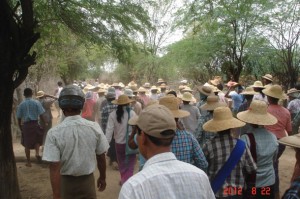 More than 300 farmers in northern Burma’s Sagaing Division have resumed their protests against a controversial Chinese-backed copper mine, saying they will refuse compensation and continue to push for the mine’s complete closure.
More than 300 farmers in northern Burma’s Sagaing Division have resumed their protests against a controversial Chinese-backed copper mine, saying they will refuse compensation and continue to push for the mine’s complete closure.
“No matter how much compensation they give, we won’t accept it, because all we want is for the mine to be shut down completely,” said one of the farmers from the Letpadaung area near Monywa […]
• •Letpadaung Report Does Not Address Concerns, Places Security Forces Above the Law
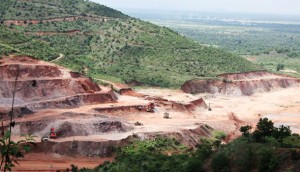 This week the much anticipated report of the Letpadaung investigation commission, appointed by President Thein Sein and chaired by Daw Aung San Suu Kyi, was finally released. The report acknowledges that the mine lacks strong environmental protection measures and would not create more jobs for local people. It also recognizes that farmers were forcibly evicted from their land to make way for the project. However the report says the copper mine project “should not be unilaterally stopped.” This recommendation deeply disappointed local farmers and activists who angrily rejected the commission’s report while the Wanbao Company welcomed it.
This week the much anticipated report of the Letpadaung investigation commission, appointed by President Thein Sein and chaired by Daw Aung San Suu Kyi, was finally released. The report acknowledges that the mine lacks strong environmental protection measures and would not create more jobs for local people. It also recognizes that farmers were forcibly evicted from their land to make way for the project. However the report says the copper mine project “should not be unilaterally stopped.” This recommendation deeply disappointed local farmers and activists who angrily rejected the commission’s report while the Wanbao Company welcomed it.
After the release of the report, Daw Aung San Suu Kyi visited the villages affected by the project to explain the findings of the commission. She called for the communities to stop opposing the project and accept compensation for their lost land. “We have asked the company to first give jobs to our people and second to maintain a healthy environment, according to international standards, and third to provide education and health care for the people,” Daw Aung San Suu Kyi said in a speech in Salingyi Township. But she was confronted by protesters who feel that the report does not acknowledge their demands […]
• • •Burmese in India Launch 5 Day-Long Sit-in-Protest in New Delhi
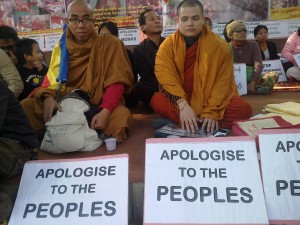 Beginning of the “5-day long peaceful sit-in-protest cum photo exhibition at Jantar Mantar in New Delhi” today, over 40 Burmese activists in India condemn the Burmese government’s brutal crackdown on peaceful protesters who demanded the suspension of Letpadaung copper mine near Monywa, Sagaing Region in Burma last month […]
Beginning of the “5-day long peaceful sit-in-protest cum photo exhibition at Jantar Mantar in New Delhi” today, over 40 Burmese activists in India condemn the Burmese government’s brutal crackdown on peaceful protesters who demanded the suspension of Letpadaung copper mine near Monywa, Sagaing Region in Burma last month […]
Protest and Persecution Under the Guise of Reformist Laws
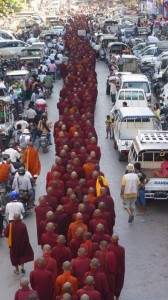 Last week saw protests spread across Burma against the deplorable treatment by the authorities against those who dared to oppose the Letpadaung copper mine. The reaction of the government was all too familiar, with more monks arrested for their participation in peaceful demonstrations.
Last week saw protests spread across Burma against the deplorable treatment by the authorities against those who dared to oppose the Letpadaung copper mine. The reaction of the government was all too familiar, with more monks arrested for their participation in peaceful demonstrations.
The incident at the Letpadaung copper mine near Monywa, Sagaing Region, saw riot police brutally break up an 11-day protest by activists and monks against the mine that is forcing people off their land and causing major environmental damage. The police stormed the protest camp in the middle of the night, used tear gas and incendiary devices to break up the rally and injured at least 65 monks, while arrests of activists were made in Rangoon.
Since the crackdown, in scenes reminiscent of the 2007 Saffron Revolution, thousands of monks marched peacefully down main streets of Rangoon, Mandalay, Myingyan, Monywa and other towns and cities. They demanded an apology for the violence from President Thein Sein, the unconditional release of those arrested, and legal action against the perpetrators of the violence. Their courage in the context of the threat of serious violence is typified by Abbot Thawbita, one of the monks demonstrating in Mandalay, who said, “We believe that if we accept this violence now, we will have to face more serious suppression.” Union Minister Hla Tun has apologized to some of the injured monks in a ceremony in Mandalay on 15 December, but this falls short of the monks’ demand that the President himself apologize. Meanwhile, those protesters arrested in Rangoon on 26 November and 2 December have been released on bail,but still face charges of inciting public unrest […]
Participation and Inclusion in Burma, Empty Words
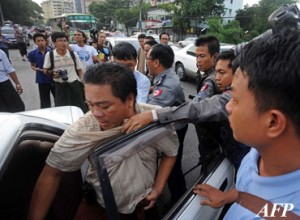 Today, 10 December marks the United Nations’ Human Rights Day. This year’s theme is inclusion and the right to participate in public life, but these concepts are conspicuously absent in Burma today, as recent events have proved.
Today, 10 December marks the United Nations’ Human Rights Day. This year’s theme is inclusion and the right to participate in public life, but these concepts are conspicuously absent in Burma today, as recent events have proved.
The Office of the High Commissioner for Human Rights (OHCHR) identifies inclusion and the right to participate in public life as “essential elements in achieving the full range of human rights for all of us… the fulfillment of the right to participate is fundamental to the functioning of a democracy and an effective human rights protection system. When the right to participate and inclusion are respected, each and every one of us is offered the opportunity to join in the debate, to offer ideas and to campaign for change.”
To commemorate this day, Daw Aung San Suu Kyi joined the OHCHR’s event in Geneva as the keynote speaker via satellite, serving as both an advocate for participation in public life and an example of a person and a place where this right to participation was, and in many cases still is, absent. One of the largest challenges facing Burma today and in the future is whether the government is willing and able to provide this basic human right of inclusion and participation to all of its citizens […]
Protests and Arrests Rise in November – Threatens Freedom of Expression
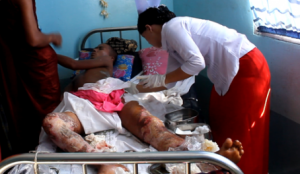 A series of both improvements and setbacks highlighted an eventful month in Burma. While advancements in international recognition made worldwide news, human rights violations persisted with far less global interest. News coverage focused on a historic visit from President Obama, and paid little attention to issues such as the government’s violation of freedom of assembly. Even as Burma stood on the world stage, the government continued a merciless crackdown on peaceful protesters.
A series of both improvements and setbacks highlighted an eventful month in Burma. While advancements in international recognition made worldwide news, human rights violations persisted with far less global interest. News coverage focused on a historic visit from President Obama, and paid little attention to issues such as the government’s violation of freedom of assembly. Even as Burma stood on the world stage, the government continued a merciless crackdown on peaceful protesters.
Among the cases of human rights violations in Burma throughout November, the blatant and unwarranted abuse of landowners and other civilians over the peaceful protest of the Letpadaung copper mine stands out as a particularly egregious offense. Since the government seized 7,800 acres of private land for the copper mine, the Burmese people have continued to exercise their right to assemble but have been met with unprovoked force […]
BURMA: Former Activist Monk and Demonstrators Among Detainees in Wave of Arrests
The Asian Human Rights Commission is concerned by a recent wave of arrests in Burma, signaling that continuation of repressive practices from earlier periods of direct military rule. Among those arrested are a number of leaders of recent demonstrations against a copper mining project in the north of the country, and a former monk who after his release from prison at the start of the year has been subjected to constant harassment and abuse […]
• • •Position Statement of KNU on Current Situation in the Country
The KNU reaffirms deeply its appreciation of effort by current Burma (Myanmar) government and its processes for securing ceasefire and peace with the armed ethnic organizations.
The violent suppression by Myanmar authorities of the ongoing people’s movement relating to Letpadaung Taung Copper Mining Project should never have happened […]
• • •Violent Crackdown Against Buddhist Monks, New Regime with an Old Method
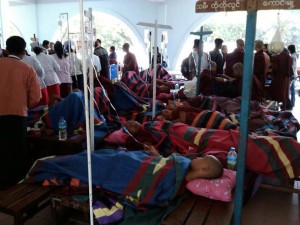 Thein Sein’s government has revealed its true colors with the surprisingly reckless and bloody crackdown on peaceful protesters in Monywa, Sagaing Region. The crackdown on the protest camps came at 3am, without any chance for the protesters to withdraw. It was an ambush and an old tactic that characterizes the old military regime that the world has been trying to believe has reformed.
Thein Sein’s government has revealed its true colors with the surprisingly reckless and bloody crackdown on peaceful protesters in Monywa, Sagaing Region. The crackdown on the protest camps came at 3am, without any chance for the protesters to withdraw. It was an ambush and an old tactic that characterizes the old military regime that the world has been trying to believe has reformed.
The Letpadaung copper project near Monywa – the largest copper mine in Burma – is a joint venture between military-owned Union of Myanmar Economic Holdings Ltd., and Wan Bao, a unit of the weapons manufacturer China North Industries Corp. The project has been facing a growing objection since August by the local communities in the Letpadaung area who say the project has confiscated as many as 7,800 acres of land, forcing them out of their villages and ruining the environment.
Riot police aggressively dispersed protesters using water cannons, tear gas and, according to protesters, incendiary devices that set the camps on flames leaving at least 50 people injured by the fire. Many of those who were severely wounded were Buddhist monks […]
• • •A Hundred Burmese in New Delhi Protest Against Letpadaung Copper Mine Project in Burma
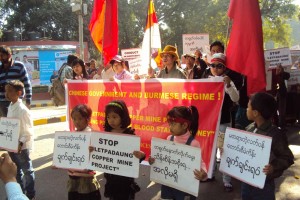 A hundred Burmese in India hold a demonstration in New Delhi today condemning the Burmese government’s brutal crackdown on peaceful protesters who demanded the suspension of Letpadaung copper mine near Monywa, Sagaing Region in Burma […]
A hundred Burmese in India hold a demonstration in New Delhi today condemning the Burmese government’s brutal crackdown on peaceful protesters who demanded the suspension of Letpadaung copper mine near Monywa, Sagaing Region in Burma […]









 All posts
All posts